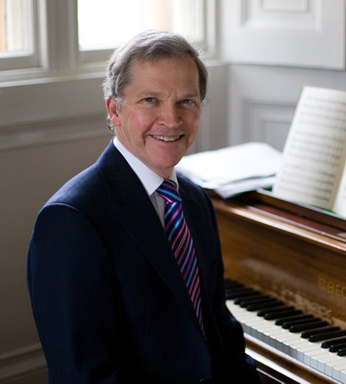Ferris Chorale presents the American premiere of Grayston Ives’ powerful Requiem

Two years in the making, the William Ferris Chorale’s “Sacred & Profane: Music of Grayston Ives” was a concert program devoted entirely to compositions and arrangements of the British singer and choral director, including the American premiere of his Requiem.
Sunday afternoon’s performance took place at Emmanuel Episcopal Church in La Grange with Ives and his wife in attendance, the composer taking part in a post-concert audience discussion.
The Requiem was composed for the 550th anniversary of Magdalen College in Oxford and was presented as part of a All Soul’s Day liturgy in 2008 by the Magdalen College Choir.
The original accompaniment included a chamber orchestra. Ives has made an organ reduction of the score to make the work more user-friendly for choruses, and thet was the version heard publicly for the first time at these concerts with Thomas Weisflog as organist.
Of special interest was a set of Tibetan Buddhist bells that open and close the work that Ives had come across before writing the piece which were used in these performances.
Intended for liturgical use, the movements are straight-ahead and full of text-painting. The Introit starts off in plainchant unison in the upper voices, fanning out as answered by the various sections before joyfully bursting forth with a hymn sung in Zion.
The Kyrie spread out in a tightly chromatic fashion, the Dominie Jesu centers around the tritone and contrasts between being upbeat (Rex gloriae) with inferni being dissonant while the mouth of the lion sees the chorus getting louder and the intervals wider.
When Michael the Archangel is mentioned as the standard bearer, the high voices diatonically dominate and reflect hope and optimism in an ethereal transition that is the highlight of the entire work. A solo tenor voice (Wain Parham) majestically lifts up his voice prayerfully which heads off into a choral round over a punchy figured bass.
The Sanctus is rhythmic and joyful, the slower but bouncy Benedictus an imitation of a handbell choir with each syllable a new note. The Pie Jesu is reposeful and the Agnus Dei a thicker layering of counterpoint that is nonetheless introspective before returning to the opening Introit.
There is no Dies Irae as this is no longer liturgically used, but some of the same words do come up in the Libera Me section in a tuneful and powerful way, dynamics being pulled way out and the organ using the trumpet stop as the final trumpet.
The section ends with plainchant with high organ accompaniment that is quite effective before the high voices initially take over for the In Paradisum finale, taken up by the various sections into a life-affirming celestial conclusion.
At fifty minutes, this is a major work, quite eclectic and effective in its use of styles. Some of it has a touch of jazz harmony and pop rhythms, a bit reminiscent of more popular composers’ attempts to write choral music such as Paul McCartney’s Liverpool Oratorio or Andrew Lloyd Webber’s Requiem but Ives’s work displays firmer grounding in contemporary music and the British choral tradition.
Under Paul French, the William Ferris Chorale rose to the nuanced demands of the work exquisitely, no small feat given that this is a work written for a full-time chorus in a country where choral singing is a way of life.
The second part of the program which showcased Ives’ arrangements of folk tunes and popular songs was far less interesting. They are clever, to be sure, but often gimmicky.
The folk song arrangements had a doo-wop quality to them, the Beatles arrangements were very much Swingle Singers-like, as in been there, done that. With a couple of exceptions, most were dependent on a soloist surrounded by a cappella choral accompaniment that were quite formulaic and which were completely dependent on the uneven quality of the soloists.
Posted in Performances

